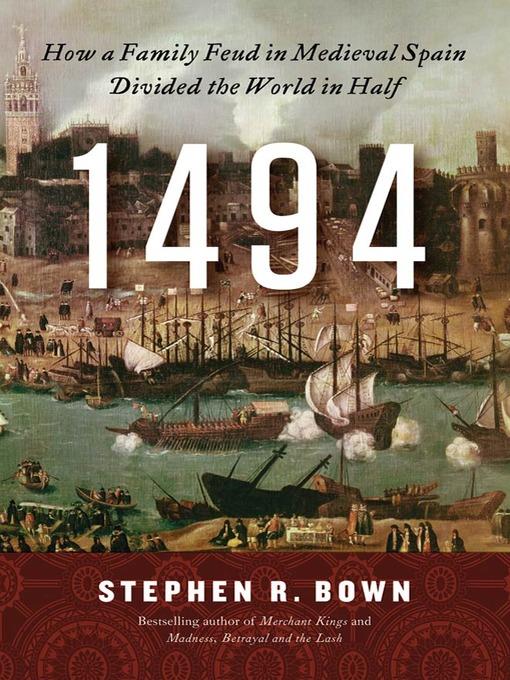
1494
How a Family Feud in Medieval Spain Divided the World in Half
- اطلاعات
- نقد و بررسی
- دیدگاه کاربران
نقد و بررسی

November 14, 2011
Historian Bown (Scurvy) offers an entertaining, though often repetitive, chronicle of intrigue, deception, and power struggles in the early modern world. When Columbus returned from the New World to Spain in 1493, Portugal’s King João II claimed that a series of papal decrees clearly guaranteed that these rich lands belonged to him. The Spanish monarchs Ferdinand and Isabella sent an envoy to Pope Alexander VI, and following the pope’s decree that Ferdinand, Isabella, and their heirs had exclusive rights to travel in and trade with Columbus’s newfound lands, Spain and Portugal signed the Treaty of Tordesillas in 1494. It extended an imaginary line on a north-south axis in the middle of the Atlantic Ocean; Portugal retained all lands east of the line, and all lands to the west of the line were the Spain’s sole domain. As Bown points out, both nations benefited from this treaty; Portugal quickly grew rich from its monopoly on the trade routes to India and the Spice Islands, while Spain overtook the Aztec, Mayan, and Inca empires, shipping home vast quantities of gold. Bown’s captivating study presents a fresh glimpse into the origins of the age of exploration and conquest as other nations challenged the primacy of Spain and Portugal. 24 illus.; maps.

November 15, 2011
Spanish-Portuguese quarrels, the voyages of discovery and an obscure 1494 treaty led to centuries of worldwide conflict, events all rousingly recounted here by Canada-based historian Bown (Merchant Kings: When Companies Ruled the World, 1600–1900, 2010, etc.). In the 15th century, Spain and Portugal were backwaters until their ships hit the jackpot by reaching America and the Indies. The author begins his history of the bloody competition that followed by pointing out that by 1480 Portugal dominated the prosperous West African trade, a monopoly granted earlier by Papal bulls. In 1493, Portugal's king insisted that Columbus' discoveries belonged to him under the same authority. Spain's rulers appealed to Spanish-born Pope Alexander VI, who obligingly decreed that new lands west of a north-south line down the Atlantic belonged to Spain, those east of it to Portugal. Popes still exerted immense authority, so the immediate result was the 1494 Treaty of Tordesillas, in which Spain and Portugal agreed on specifics. In the second half of the book, Bown describes the subsequent vast expansion of European settlement, commerce and violence. No one believed in free trade. Spain and Portugal forbade unauthorized commerce throughout their empires, seizing foreign ships and often executing crews. In response, Holland, Britain and France fought their way into foreign ports (whose citizens, once defenders surrendered, were happy to trade) and seized Spanish and Portuguese ships. Piracy flourished, and governments authorized privateering even during peacetime to allow merchants to recover losses. A well-delineated, exciting history of a particularly contentious period of international trade, which persisted for centuries until Spain and Portugal grew too weak to resist and did not disappear until nations decided that oceans should be open to all.
(COPYRIGHT (2011) KIRKUS REVIEWS/NIELSEN BUSINESS MEDIA, INC. ALL RIGHTS RESERVED.)

December 15, 2011
Ever wonder how the inhabitants of Brazil came to speak Portuguese? The answer to that question can be found in the 1494 Treaty of Tordesillas, where in an effort to stave off a war for global hegemony, Pope Alexander VI divided the New World between the Spanish and the Portuguese. With the advent of the Protestant Reformation, however, France, England, and the Dutch Republic employed a combination of legal argument and piracy to end the Iberian mercantile monopoly. In this popular account spanning the Age of Exploration, Brown (Merchant Kings, 2009) argues that Alexander's line of demarcation, sanctioned by God and backed by the threat of excommunication, was part politics, part sound decision, and part disaster waiting to happen. Brown incorporates a sprawling cast of characters, including Ferdinand and Isabella, Columbus, Magellan, Sir Francis Drake, and members of the ostentatious Borgia clan, into what is both a judicious synthesis of the surrounding scholarship and an entertaining look at the evolution of international law on the high seas. In lieu of earth-shattering revelations, Brown provides general readers and fans of the period with a work meant for pure enjoyment.(Reprinted with permission of Booklist, copyright 2011, American Library Association.)




دیدگاه کاربران